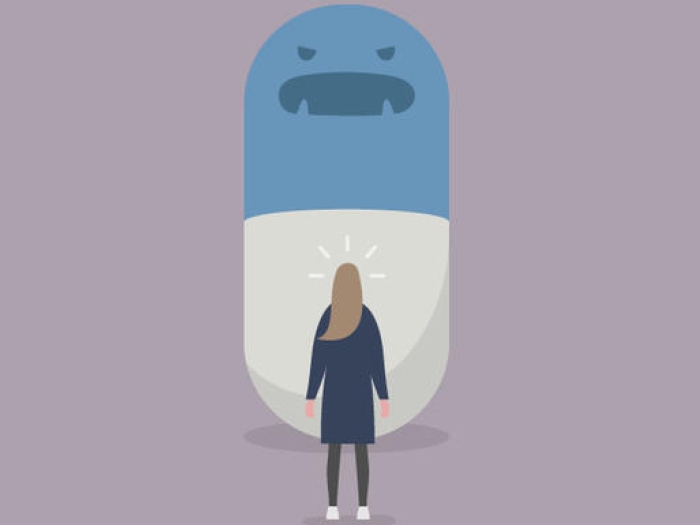A team examines barriers to the use of a proven strategy to protect the stomachs of patients at high risk for bleeding.
9:47 AM
Author |

Gastrointestinal bleeding is a potentially life-threatening condition. It is often linked to the use of medications like non-steroidal anti-inflammatory drugs, or NSAIDS, like ibuprofen and naproxen, aspirin and blood thinners.
"Many of these drugs are prescribed to individuals who have heart disease," said Jacob E. Kurlander, M.D., M.S., an assistant professor and gastroenterologist at Michigan Medicine and the VA Center for Clinical Management Research. "And while medicines like aspirin and blood thinners like warfarin can be life-saving for patients at risk for heart attacks and strokes, they can also lead to gastrointestinal bleeding."
Proton pump inhibitors, or PPIs, are generally prescribed by physicians to help treat digestive issues like gastroesophageal reflux disease. However, Kurlander notes that their role in the prevention of gastrointestinal bleeding is often overlooked.
"PPIs have gotten a lot of press lately because they've been linked to things like kidney disease, diarrhea and certain mineral deficiencies. But it is far from clear that they actually cause these conditions," said Kurlander. "Of course, this raises the question of whether physicians may be limiting their use of PPIs as a preventative measure for gastrointestinal bleeding."
This notion led Kurlander and a team of experts to examine the "prescribing practices and barriers" associated with the use of PPIs as "gastroprotection" from bleeding. Their research was recently published in the Annals of Family Medicine.
"We wanted to take a look at a diverse group of physicians, so our sample included primary care doctors, cardiologists, gastroenterologists and vascular surgeons," said Kurlander. "All of these specialists routinely treat patients who may benefit from PPIs for bleeding prevention."
The team interviewed the physicians about how they prescribe PPIs, as well as the factors they feel serve as barriers when it comes to using them for bleeding prevention. And they found a few major themes.
"Many physicians overlooked the effectiveness of PPIs for bleeding prevention and weren't aware of guidelines that recommend them for this purpose," said Kurlander. "As a result, thinking about PPI gastroprotection rarely got prioritized in busy clinic visits, when patients may have many other pressing issues."
Many physicians overlooked the effectiveness of PPIs for bleeding prevention and weren't aware of guidelines that recommend them for this purpose.Jacob E. Kurlander, M.D., M.S.
In addition, concerns about the adverse effects from PPI use created a reluctance for some physicians to prescribe these drugs: "For PCPs especially, the possibility of side effects are top of mind when they think about PPIs," said Kurlander.
MORE FROM THE LAB: Subscribe to our weekly newsletter
Kurlander notes that for patients who may see many different medical specialists, it can often be unclear who should be responsible for considering whether a PPI is needed for bleeding prevention. And he adds that "it was interesting to see that no single specialty assumed ownership of prescribing PPIs to their patients for the sole purpose of gastroprotection."
When it came to gastroenterologists, vascular surgeons and cardiologists, the consensus was that gastroprotection was something they felt PCPs should actively manage. However, many of the PCPs felt differently.
"We found that PCPs generally felt that if another specialist prescribed a drug that can cause ulcers and bleeding, then they should also prescribe a PPI for gastroprotection," said Kurlander. "Overall, this research helped us understand that there needs to be better coordinated care for these patients. There are a lot of studies published in gastroenterology journals about PPIs and gastroprotection because these specialists are the ones who end up treating patients who develop bleeding ulcers. But to prevent bleeding ulcers in the first place, we need to increase the awareness among PCPs and cardiologists, who prescribe medicines like ibuprofen and aspirin, which are the inciting drugs."
As Kurlander looks to the future, he hopes that this research will lead to some crucial changes.
"If relevant guidelines target both PCPs and specialists at the same time, there will be more clarity about who should prescribe PPIs for gastroprotection, which is often overlooked," he said. "I know it's easier said than done, given that a lot of specialists aren't used to prescribing PPIs for this reason. But it will certainly take a collaborative effort moving forward."
Paper cited: "Barriers to Guideline-Based Use of Proton Pump Inhibitors to Prevent Upper Gastrointestinal Bleeding," Annals of Family Medicine. DOI: 10.1370/afm.2734
Like Podcasts? Add the Michigan Medicine News Break on iTunes, Google Podcasts or anywhere you listen to podcasts.

Explore a variety of health care news & stories by visiting the Health Lab home page for more articles.

Department of Communication at Michigan Medicine
Want top health & research news weekly? Sign up for Health Lab’s newsletters today!





